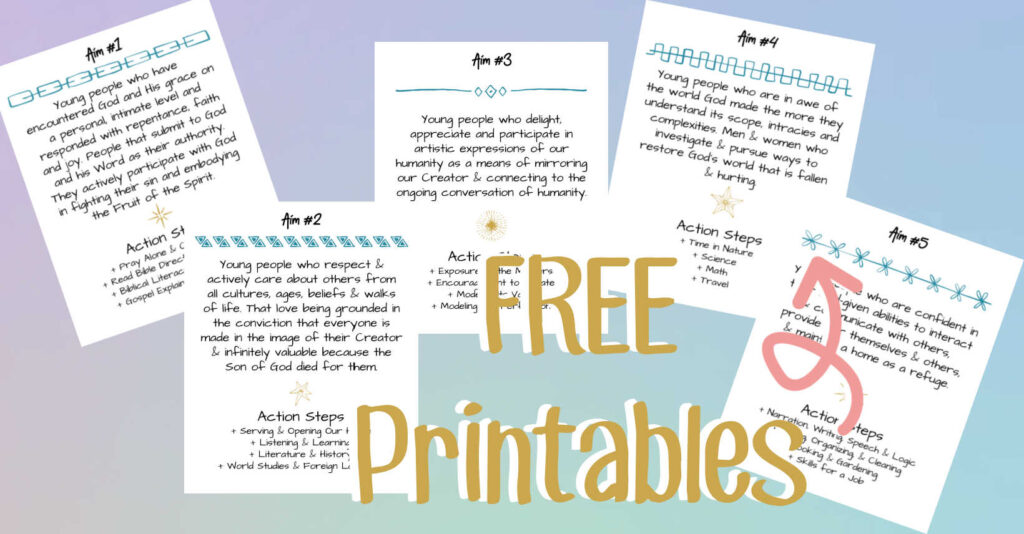Your eyes are alight with the excitement of your decision and the possibilities in front of you. You’re going to homeschool your kids!
You envision cozy mornings learning together, adventures exploring the world around you, and a tearful “thank you” from your grown kids when they graduate.
But not five minutes after your decision, the advertisements start showing up on your phone.
“This math curriculum is the one that NASA recommends. This reading program will get your child 4 grade levels ahead. This history book will teach your kids the “real” story.”
The message is clear: “Buy me or fail as a homeschool mom.”
As a seasoned homeschooler, I feel protective of new parents. I want to help calm your panic and give you a different approach that will help you lay a foundation of confidence as you navigate this educational journey.
This post contains affiliate links for your convenience. Please read my full disclosure policy here.

Where to Start: WHY you should figure out your Homeschool Philosophy First
A Homeschooling Philosophy???
I know, that seems a little high brow and probably super overwhelming to a new homeschooler, but hear me out.
If you don’t have a destination in mind, a goal to shoot for, you’re going to flounder.
But if you know the goal of your child’s education, having a clear picture in your mind of your priorities and the methods you think will achieve them, then you’ll be able to weigh curriculum and advice through that lens and save yourself a lot of whiplash.

How Do I Choose a Homeschooling Philosophy?
- Get specific. Write it Down.
It can be easy to have vague, general goals for your kids. But when you narrow things down, you’ll be much more focused on what your priorities are. Be RUTHLESS in your elimination of extras, and only keep the things that matter to you and your family.
If you’re looking for ideas, feel free to checkout what I did for my family.
I thought through five big areas of life that I wanted my boys to excel at, cast a “vision” of what I’d love for them to be like as adults, and then listed some of the things we can do in the daily grind that will help steer us there.
I look over these aims at least monthly, before I pick a curriculum or set a schedule, and whenever I’m discouraged.
Get those FREE Homeschool Goals HERE!

- Ask Others
With homeschooling gaining popularity, it’s almost a given that you’ll personally know a couple homeschool veterans. Pick their brains about what methods they follow. Ask for their honest assessments of what they like about their particular homeschool philosophy and what hasn’t worked well with their theories.
Bring paper and pen. Homeschoolers LOVE to talk shop. - Consider BOTH Your Child’s Needs & Yours
When weighing homeschooling methods, factor in your personalities, strengths, and weakness.
Do you have a kid that devours books? Do your kids come from a long line of engineers and love math and science? Are you extroverted or introverted? Does your family love spontaneity or prefer structure?
You need to have these very real people in mind when you think through homeschooling philosophies. Don’t sacrifice real life for an ideal. Plan and dream, but go for something that is enjoyable, stretching, yet not an impossible burden. - Get an Overview of Homeschool Philosophies
There are quite a few homeschool ideologies out there. You’ll be drawn to some, repulsed by others, and intrigued by many.
A great resource for educating yourself is the book The Call of the Wild and Free which is full of encouragement for new homeschoolers, but also does a great job of giving an overview of many different methods, including perspectives from influencers who choose them.
Jump to my next section to get a Birdseye view of different homeschooling philosophies and methods. - Deep Dive Into One Philosophy
Pick a homeschooling method that is your top contender and dig deeper! No blog post, podcast, or conversation with a friend will be able to give you a full scope of a homeschooling philosophy.
Get some books, subscribe to some influencers that follow the method, and see if you can borrow some curriculum from a friend that falls in line with this type of philosophy.
I almost dismissed my chosen homeschooling method because I misunderstood what it was really about!

What Are Some Popular Homeschool Philosophies?
Below, I’ll share a very brief synopsis of some of the most popular homeschooling methods used today. While I’ll try to be fair, please realize that my homeschool philosophy will be hard to disguise. 😉
- Traditional
While I’d argue this is a misnomer, people that want to mimic the teaching methods of the public schools will go the traditional route.
Expect textbooks, worksheets, lots of seated work etc. Expect LOTS of options for curriculum.
Pros:
1) It feels safe and controlled. Many people start with this method as they grow in confidence.
2) Some motivated/gifted kids can blaze through their school work and use the rest of their day for their passions (think of the Olympic athletes, or musical geniuses of the world)
3) You can easily reintegrate your kids into public school if you want to do that later down the road.
Cons:
1) Often doesn’t produce true learning.
2) Typically dull and boring, one size fits all material.
3) Usually harmful to kids with learning disabilities. - Neo Classical
Claiming to be in line with ancient western views on education (think Aristotle, Socrates and Plato) these homeschoolers place a big emphasis on great literature and solid thinking skills.
Neo classists also believe in three stages of learning over the course of a child’s life. (This is based on a modern essay by Sayers, not the Ancients.)
First comes the grammar stage, where kids are sponges that memorize tons of information without much context. Next, middle schoolers enter the logic stage where they start to make connections to the facts they learned. Finally, students reach the rhetoric stage which is when they develop their communication skills so they can take what they’ve learned and influence the world with it.
Pros:
1) Lots of great books that get students connected to “The Great Conversation” that humanity has been engaging with for millennia.
2) Students eventually learn deep logic and communication skills that help them be movers and shakers in their world.
3) A very rigorous education.
Cons:
1) The reality of three stages may be too simplistic, confining and frustrating for younger ages.
2) The demanding pace and push to gain skills that are grade levels beyond the average student, can burn kids out or leave kids behind.
3) There is a tendency to only focus on Western culture (though that seems to be shifting in the past couple years.) - Charlotte Mason
This British educator set out to apply the ancient traditions into what was her modern England.
Similar to Neo Classical in its emphasis on broad reading, Charlotte Mason used the analogy of spreading a feast of living ideas for children’s souls to feed on. Even young children are expected to make connections and glean life giving truths from things like Fairy Tales, Shakespeare, and history.
Student narration is the primary tool used to make those connection and solidify knowledge into kids memories. There are rarely worksheets or testing.
Pros:
1) A wide and beautiful education full of the subjects that make us more human.
2) Respects the child’s personhood and the role of our ultimate teacher, God.
3) Excellent for students with learning disabilities.
Cons:
1) Can feel like an overwhelming amount of subjects (like poetry, dictation, Latin, nature study, etc)
2) Teacher involvement is high, especially for younger kids or those with learning struggles.

- Unit Studies
This method of homeschooling focuses on a different theme for a certain period of time and builds all of its lessons around that theme.
Say you decide to do an ocean theme for the month, you can gather up books, documentaries, crafts, and field trip possibilities that center on those themes. Especially for younger ages, it can be pretty easy to incorporate science, literature, math, and even some history into the theme.
Pros:
1) Lots of fun (sometimes more so for the teacher!)
2) Memorable, fully of variety, and interest lead
Cons:
1) Lots of planning involved.
2) Difficult to make sure all skills are being covered.
3) Hard to continue in the older grades. - Unschooling/Child Led
If you’re looking for an outside of the box education, this is it! Unschoolers believe real world experience is a better teacher than structured learning. The focus is on following the child’s interests.
Because of this, each Unschooling home is going to look drastically different than another. By not getting bogged down in textbooks and doing things in “the right order”, these students are free to dig deep into their passions. Kids can apprentice with experts, travel the world, or play in the woods for the majority of the day.
Pros:
1) The possibility of being highly skilled in a narrow field.
2) Shouldn’t be much push back from kids, since it’s interest led.
3) A truly unique, tailored education.
Cons:
1) Can be lots of work and will keep you on your toes.
2) You’re limited by your resources and connections.
3) Some personalities will use this as a means of laziness.
4) Risk major gaps in knowledge and skills. - Eclectic
If you don’t want to be confined to a box, don’t! You can mix and match these homeschooling philosophies and others.
Pros:
1) You can have the best of all worlds.
2) It’s easy to pivot if things aren’t working.
Cons:
1) You may lack direction. Be sure you have your aims solidly in mind!
2) You may feel lonely. (Homeschoolers can be passionate about their philosophies!)
Educating With Your Educational Philosophy In Place
I know it can be fun to research homeschooling curriculum and purchase the next shiny thing that promises to teach your kids to be the most amazing people on earth. But before you spend a cent, take a while to lay the foundation of your educational philosophy.
I promise, it will be an anchor for you as the years go by.




Leave a Reply